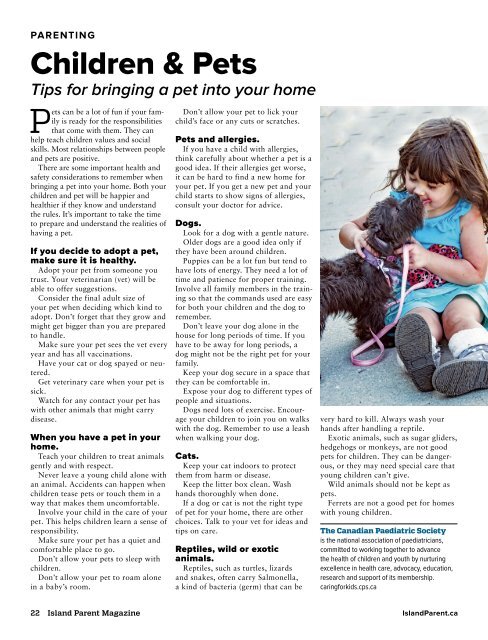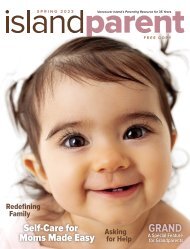Island Parent Resource Guide Vol 35
Vancouver Island’s Parenting Resource for 35 Years: Family Support • Classes & Programs • Health & Wellness • New Parent Resources • Family Fun & Entertainment • Overnight Camps • Family Travel
Vancouver Island’s Parenting Resource for 35 Years: Family Support • Classes & Programs • Health & Wellness • New Parent Resources • Family Fun & Entertainment • Overnight Camps • Family Travel
Create successful ePaper yourself
Turn your PDF publications into a flip-book with our unique Google optimized e-Paper software.
PARENTING<br />
Children & Pets<br />
Tips for bringing a pet into your home<br />
Pets can be a lot of fun if your family<br />
is ready for the responsibilities<br />
that come with them. They can<br />
help teach children values and social<br />
skills. Most relationships between people<br />
and pets are positive.<br />
There are some important health and<br />
safety considerations to remember when<br />
bringing a pet into your home. Both your<br />
children and pet will be happier and<br />
healthier if they know and understand<br />
the rules. It’s important to take the time<br />
to prepare and understand the realities of<br />
having a pet.<br />
If you decide to adopt a pet,<br />
make sure it is healthy.<br />
Adopt your pet from someone you<br />
trust. Your veterinarian (vet) will be<br />
able to offer suggestions.<br />
Consider the final adult size of<br />
your pet when deciding which kind to<br />
adopt. Don’t forget that they grow and<br />
might get bigger than you are prepared<br />
to handle.<br />
Make sure your pet sees the vet every<br />
year and has all vaccinations.<br />
Have your cat or dog spayed or neutered.<br />
Get veterinary care when your pet is<br />
sick.<br />
Watch for any contact your pet has<br />
with other animals that might carry<br />
disease.<br />
When you have a pet in your<br />
home.<br />
Teach your children to treat animals<br />
gently and with respect.<br />
Never leave a young child alone with<br />
an animal. Accidents can happen when<br />
children tease pets or touch them in a<br />
way that makes them uncomfortable.<br />
Involve your child in the care of your<br />
pet. This helps children learn a sense of<br />
responsibility.<br />
Make sure your pet has a quiet and<br />
comfortable place to go.<br />
Don’t allow your pets to sleep with<br />
children.<br />
Don’t allow your pet to roam alone<br />
in a baby’s room.<br />
Don’t allow your pet to lick your<br />
child’s face or any cuts or scratches.<br />
Pets and allergies.<br />
If you have a child with allergies,<br />
think carefully about whether a pet is a<br />
good idea. If their allergies get worse,<br />
it can be hard to find a new home for<br />
your pet. If you get a new pet and your<br />
child starts to show signs of allergies,<br />
consult your doctor for advice.<br />
Dogs.<br />
Look for a dog with a gentle nature.<br />
Older dogs are a good idea only if<br />
they have been around children.<br />
Puppies can be a lot fun but tend to<br />
have lots of energy. They need a lot of<br />
time and patience for proper training.<br />
Involve all family members in the training<br />
so that the commands used are easy<br />
for both your children and the dog to<br />
remember.<br />
Don’t leave your dog alone in the<br />
house for long periods of time. If you<br />
have to be away for long periods, a<br />
dog might not be the right pet for your<br />
family.<br />
Keep your dog secure in a space that<br />
they can be comfortable in.<br />
Expose your dog to different types of<br />
people and situations.<br />
Dogs need lots of exercise. Encourage<br />
your children to join you on walks<br />
with the dog. Remember to use a leash<br />
when walking your dog.<br />
Cats.<br />
Keep your cat indoors to protect<br />
them from harm or disease.<br />
Keep the litter box clean. Wash<br />
hands thoroughly when done.<br />
If a dog or cat is not the right type<br />
of pet for your home, there are other<br />
choices. Talk to your vet for ideas and<br />
tips on care.<br />
Reptiles, wild or exotic<br />
animals.<br />
Reptiles, such as turtles, lizards<br />
and snakes, often carry Salmonella,<br />
a kind of bacteria (germ) that can be<br />
very hard to kill. Always wash your<br />
hands after handling a reptile.<br />
Exotic animals, such as sugar gliders,<br />
hedgehogs or monkeys, are not good<br />
pets for children. They can be dangerous,<br />
or they may need special care that<br />
young children can’t give.<br />
Wild animals should not be kept as<br />
pets.<br />
Ferrets are not a good pet for homes<br />
with young children.<br />
The Canadian Paediatric Society<br />
is the national association of paediatricians,<br />
committed to working together to advance<br />
the health of children and youth by nurturing<br />
excellence in health care, advocacy, education,<br />
research and support of its membership.<br />
caringforkids.cps.ca<br />
22 <strong>Island</strong> <strong>Parent</strong> Magazine <strong>Island</strong><strong>Parent</strong>.ca
















